Meet the SAF musicians who signed on because of their secondary school band experience
Do they only play at National Day Parades? Are they trained soldiers? And does being in the army kill the creativity needed to make music? Members of the Singapore Armed Forces' Central Band shed light on life as a military musician.
.jpg?itok=dZCZnj13)
(From left) ME2 Jonathan Lim, ME2 Zulhafeez Zainuri, ME2 Isabelle Wong, ME5 Ignatius Wang and ME2 Benjamin Wong first fell in love with music in their secondary school band. (Photo: CNA/Raydza Rahman)

This audio is generated by an AI tool.
SINGAPORE: After more than two decades serving in the Singapore Armed Forces (SAF), Military Expert 2 (ME2) Jonathan Lim is naturally unflappable, until a question causes him to break character.
The 44-year-old regular serviceman turns into a kid again while recalling an unlikely inspiration for his military career. His childhood obsession with renowned American saxophonist Kenny G planted the seeds that would eventually blossom into a career with the SAF Central Band that has spanned 23 years and counting.
“When I was in primary school, I listened to a lot of Kenny G. He was really big in the 90s and his music was very captivating. I remember going to bed listening to his music,” he gushed.
“So when I progressed on to secondary school and I could choose a CCA, I noticed I could actually learn the saxophone from joining the band ... and I insisted I only wanted to play that instrument.”
Today, ME2 Lim is a saxophonist and the longest-serving military musician in the SAF Central Band. After studying computer programming at a polytechnic, he felt the tech industry wouldn’t be a good fit and returned to the SAF's musical arm where he had served his National Service.
Known as the SAF Band, it comprises the Ceremonial Band – made up of men serving the compulsory two years of National Service and those on reservist – and the Central Band, staffed by professional musicians like ME2 Lim who are regular servicemen and servicewomen.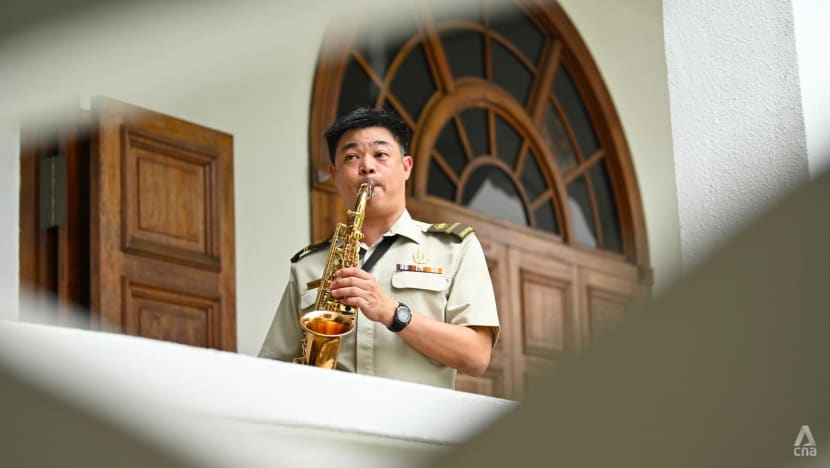
Several of his colleagues also fell in love with music from playing in their secondary school band and, from a young age, envisioned no other career path for themselves.
And like him, they too continue to fight misconceptions about their chosen profession when music is rarely seen as a “viable” career.
DOMESTIC, INTERNATIONAL DUTIES
ME2 Isabelle Wong, a vocalist and bassoon player for the band, took the plunge after obtaining a diploma in business studies. “I knew that if I didn’t sign on now, if I didn’t do music, then I would never do music again,” the 32-year-old said.
Throughout her 12 years of service, she has had some people express surprise that “this is a full-time job that the SAF employs (us) for”, while others believe those in the band “are not soldiers”.
“That's very alarming. All of us are BMT (Basic Military Training) trained, and actually, a lot of the guys here have gone through their NS life without doing music here in SAF Band. They are as capable as any other trained soldier that you meet who is not doing music,” she said.
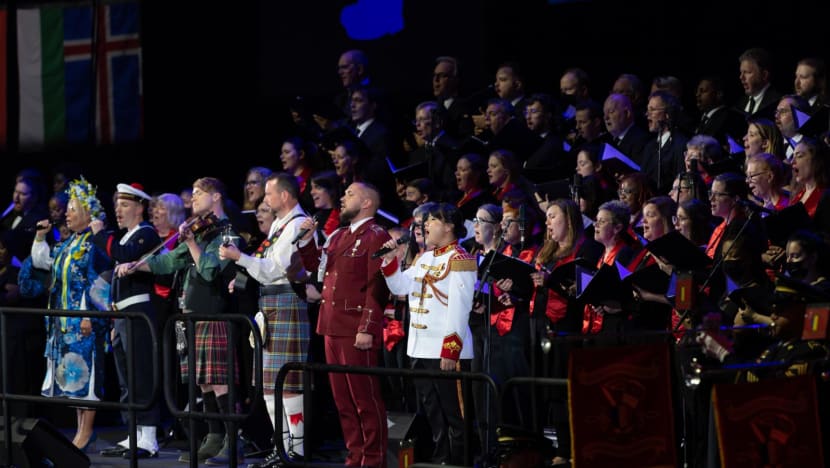
ME2 Lim, on the other hand, understands the lack of awareness. Many people may only recall seeing the SAF Central Band perform at National Day Parades or at the Istana. This is “probably the image that the public perceives first”.
Domestically, the band also regularly stages concerts in its various capacities – like a wind orchestra, and chamber and jazz ensembles – and conducts school outreach programmes.
On the international front, the band represents SAF at military music festivals and has played in countries like Canada, Scotland, US and Russia.
“In the realm of defence in Singapore, I think that there is a misconception that it’s always violent,” added ME2 Isabelle Wong.
“But actually, the peace … and the presence that we bring to the world stage is very representative of how our nation carries itself. And that is a message that cannot be related just through violence.”
A “VIABLE OPTION” FOR ASPIRING MUSICIANS
While educating the young about broader messages of soft diplomacy is important, ME2 Lim believes it’s equally crucial for the band’s school outreach to instil a sense of awe. Many students at that age would have only been exposed to their school’s military band, he said.
“But when we go and play for them, they suddenly have an epiphany. Like, wow, this is how a band can really sound. We go there and we play Star Wars; we play movie themes that are iconic and they hear live how great it can sound … They suddenly see it as a skill that’s rather impressive, and they will look up more to the school band.”
These school sessions also allow aspiring musicians to see the SAF as a “viable option” for their future aside from joining orchestras, he added.
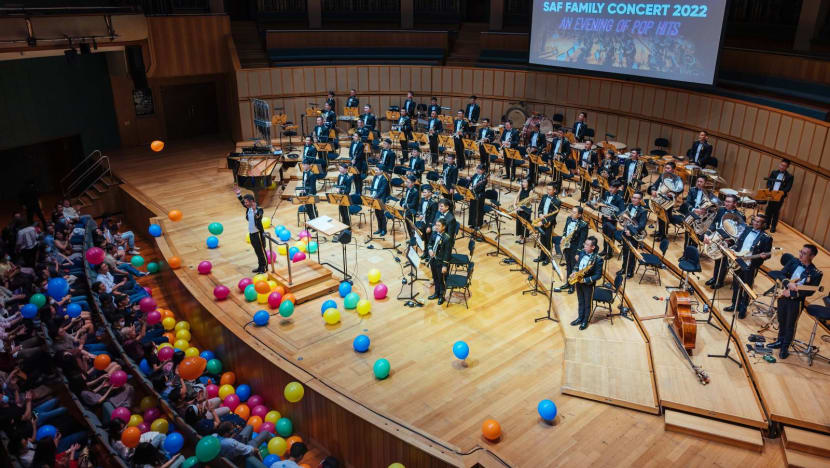
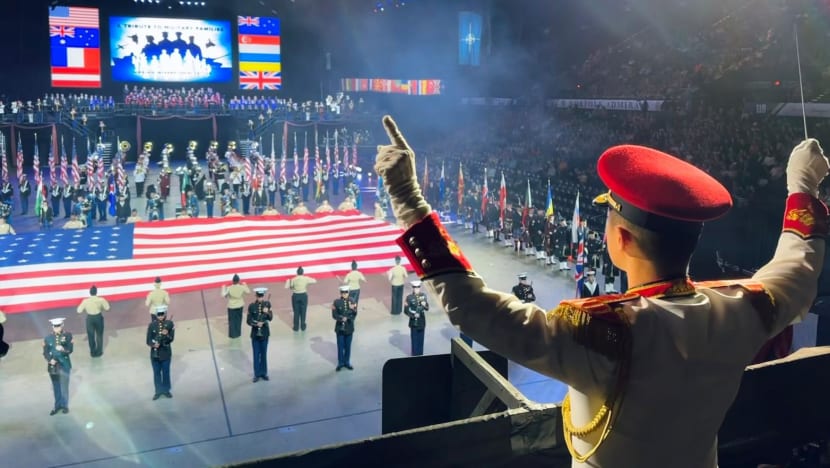
That said, the band’s Director of Music ME5 Ignatius Wang acknowledged that the talent pool is “really small” in Singapore – and not just because it’s difficult to find a musician who’s good enough.
They must also be “willing to put on a uniform, go through BMT, serve the country, and march and perform for every single National Day Parade”, whose rehearsals eat up their weekends every year from as early as March, said the 33-year-old conductor.
“However, the good thing is when we do actually find that one person, it’s a big celebration and it gives a big boost to the rest of the band," he added.
"To circumvent that, the majority of our musicians are headhunted and we look for them, even when they're still in secondary school. They come to our concerts and when we take photos, we ask for their names and we leave our numbers."
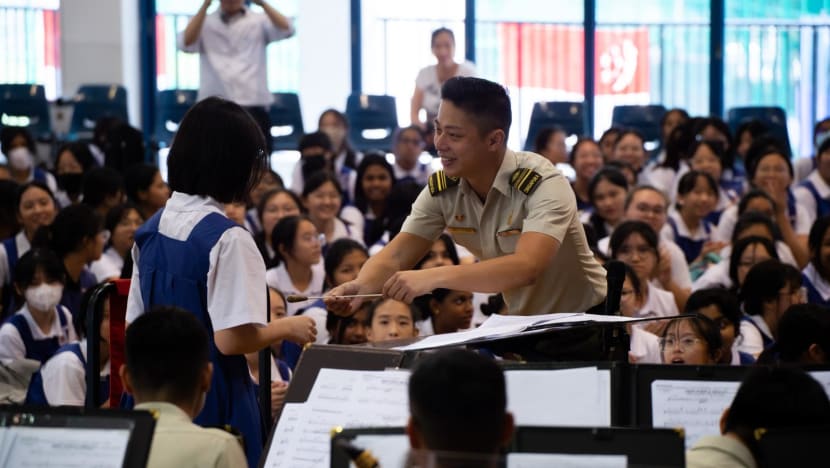
ME5 Wang, too, started as an adoring fan of the musicians he now manages before he was appointed the youngest Director of Music for the SAF Ceremonial Band at 24. He then took on his current role in May last year.
Unlike his bandmates who found their calling with their instrument, the euphonium player knew he wanted to be a conductor after he conducted his secondary school’s National Day Parade when he was 14.
But studying conducting meant going overseas for a degree in music – which his family could not afford. The SAF Central Band became a clear choice as it gave him the chance to make music and serve the country “in a meaningful way”.
When the band does their recruitment today, ME5 Wang, who eventually received a full scholarship to study music, empathises with those who may have concerns about money. Still, he tries to highlight that it's a chance to be “in the company of great musicians with the same desire to serve”.
If someone is attracted by that, “then we can talk about money”, he said, reassuring aspiring military musicians that the pay is “comfortable”.
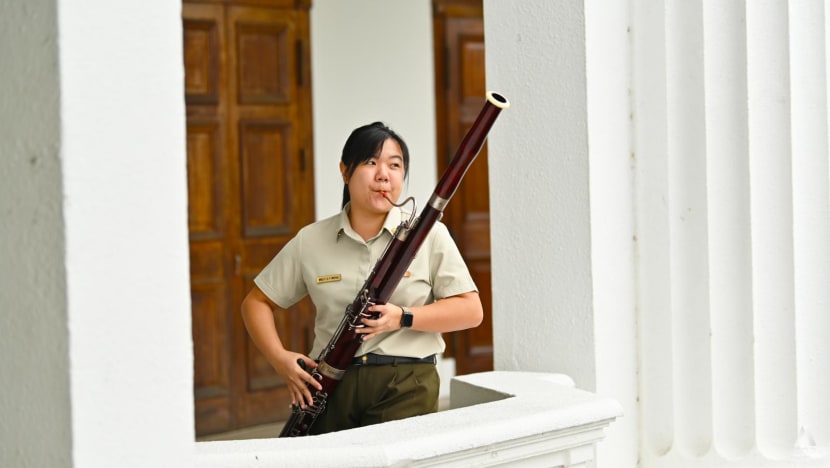
ROUTINE, DISCIPLINE NEEDED IN MILITARY AND MUSIC
Another perception is that a musician’s free-spirited creativity and the military’s rigid structure are at odds. But band members pointed out that the military’s rigour, in fact, enforces the discipline needed to master an instrument.
ME2 Lim believes even seasoned musicians should train for three to six hours every day. He expands his own musical abilities by dabbling in more than one instrument and genre of music, noting that simply getting a child to play music “develops character and instils discipline”.
ME2 Isabelle Wong, who learnt the piano as a child, admitted that while she didn’t enjoy being graded, the discipline made her “a more holistic” musician. “It’s not just about enjoying music. It involves a lot of commitment and sacrifice to get something that you intangibly want.”
As such, “simple things that secondary school kids also practise in their CCA” remain “fundamentals” that are “always important no matter what stage you’re at”, she said.
“Our instruments are very temperamental. So we have to care for it in a way that evolves together with the instrument; it is never the same every day. That’s part of the daily routine – I have to tune myself to the instrument and the instrument to myself."
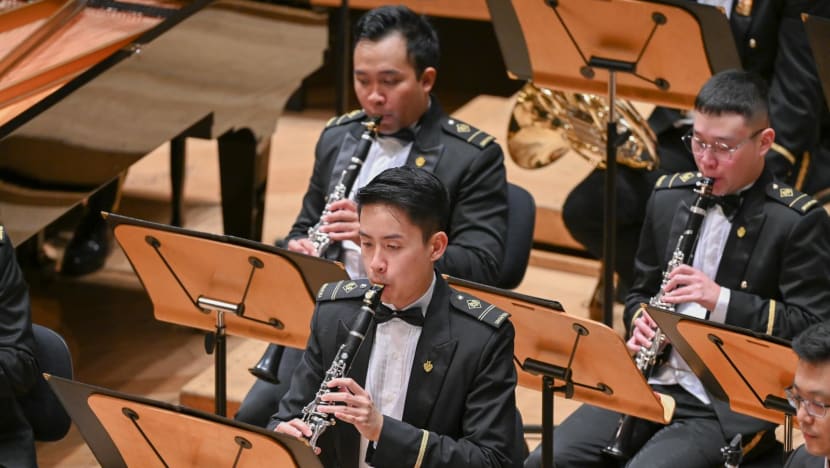
Similarly, the military’s exacting standards mirror the desire of clarinet players ME2 Benjamin Wong and ME2 Zulhafeez Zainuri to constantly improve their craft.
Despite being less than a year in service since leaving his career in academia, ME2 Benjamin Wong has always considered himself a performer. The 33-year-old, who served his NS in the band, considered the career switch after watching the SAF Central Band perform at the Esplanade at the start of the pandemic.
“They were hiring more mid-careerists, more people trained in their craft for their expertise … And what I really liked about the changes is that they recognise not just our qualifications, but also how they treasure us as musicians as performers, in and of ourselves,” he said.
“We are pushed artistically in terms of our musicianship and professionalism, how we carry ourselves as part of the army, how we carry ourselves outside to our musician friends as artists ourselves. So it's different (from the past). It's more dynamic.”
Having musicians in his family, including his younger brother who plays the clarinet for the Singapore Police Force’s band, ME2 Zulhafeez is also familiar with the hunger to improve.
Even if he wasn’t in the army, he would be “doing the same thing like practising really hard”, admitted the 31-year-old Associate Principal Clarinet who has served for three years.
“Not just in the army, but as a musician, we are built to always want to outdo ourselves. Every day, learning a new piece, we just want to perform the best that we can, as a soloist or as a chamber group, or as a band ... So adding the army (aspect) to it, it's not any different.”
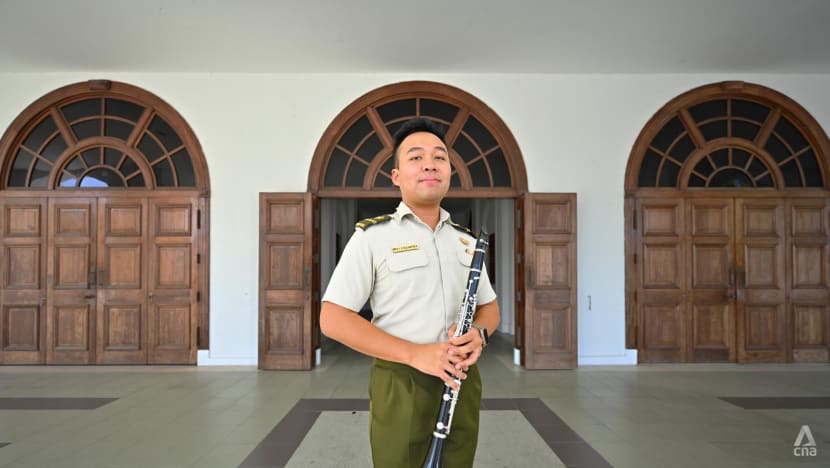
In fact, representing the country as a professional band trains them to be “more versatile”, he believes. “We can do outdoors and can play well indoors. It is something that not any musician can do. So it's something I feel we have an advantage over.”
To condition themselves for upcoming parades, the band has regular drill sessions on the parade square, playing and marching with instruments. At the same time, they prepare for indoor concerts with full band rehearsals.
“It’s rewarding because you can see the level of professionalism in your colleagues. It’s something I see every day; coming to work in the early morning to practise, to warm up. And then when we come together, it’s very efficient and very quickly we learn the pieces together,” said ME2 Zulhafeez.
“If there are no parades or concerts, we come to work to practise or come together as a section to improve and help one another.”
PUTTING ON A SHOW
For ME5 Wang, however, daily practice looks different. The average audience member assumes the conductor is “the most powerful person on stage”, but the “real” music making is by the musicians, he said.
His preparation entails internalising every score well enough to know each instrument’s part in the final piece, as well as studying the deeper context and messaging in the overall composition.
“In the score, the composer (may) say everyone plays loud, but if they really do that, it will be just a mess of sound. So how do you basically organise the sound? What sounds will come up more? What sounds should lead? Which sounds should follow?” he explained.
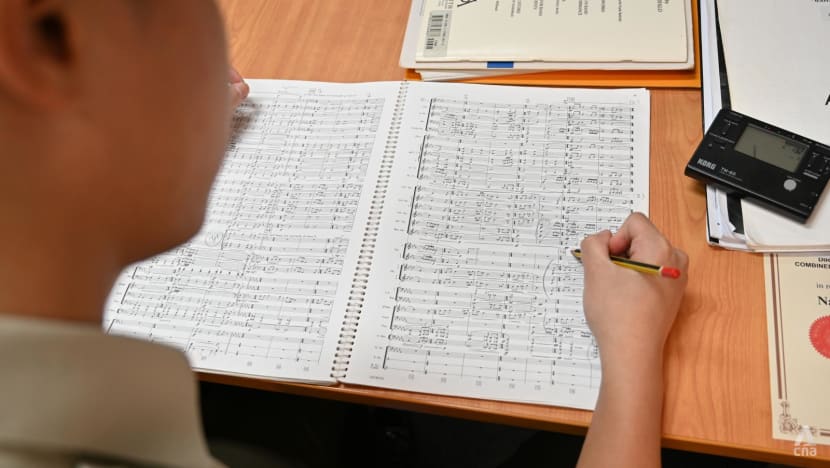
While the military uniform may be a deterrent for some aspiring musicians, those who spoke to CNA pointed out that getting to play music for a bigger purpose trumps all.
“You can make good music everywhere you go … but here, you perform way beyond just for music's sake. You perform for the country. You perform all over the world and it's not for yourself,” said ME5 Wang.
For starters, let children enjoy the process of learning music rather than pressure them to chase certification, suggested ME2 Lim, who is also a father of two.
If they “innately love” certain genres or artistes, like BTS or Taylor Swift, parents should “encourage them to play the instruments to these music that they listen to, so they can make the connection to the music they like”.
Doing this also cultivates the idea that music is “not something that one sees as a second choice or a backup plan”, but something that “people actually want to do and aspire to be (part of)”, added ME2 Isabelle Wong.
She and her bandmates are, after all, constantly reminded of the significance of their decision decades after they fell in love with music.
“It's not (a small thing) to find yourself in a situation where you represent a nation. You go overseas and your hobby that you discovered in Secondary 3 is suddenly on the world stage. That’s a very intense feeling.”
















